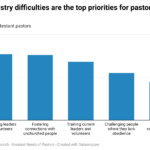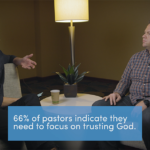
The prayer focus for the week is on the preparation of the sermon and the people. But what do you pray for when it’s over?
By Chris Hulshof
In the life and times of a college professor, December marks the end of a season. The last lecture is taught, a final exam is taken, and students you’ve spent the past sixteen weeks with leave your classroom.
For professors, those sixteen weeks are spent teaching, mentoring, encouraging, and praying for their students. But what do you pray for now that the semester is over?
The same is true for pastors. The prayer focus for the week is on the preparation of the sermon and the people. But Sunday, after the last member leaves the building, what do you pray for now that it’s over?
Having spent plenty of time in a classroom and behind a pulpit, I’ve learned to pray for three things early in the week before gearing up for another round of sermon preparation.
1. Pray for Apollos.
Paul writes in 1 Corinthians 3:6, “I planted, Apollos watered, but God gave the growth.”
In this verse, Paul recognizes that someone came after him and continued what he began. In the same way, someone will follow up with what you’ve communicated. Pray for that person.
Most of the time, we have no idea who Apollos is. For my students, Apollos might be a pastor or youth pastor. It might be a small group leader or a podcast from a Christian leader they frequently listen to.
Regardless of who their Apollos is, they’ll be watering what I’ve planted throughout the semester.
The same is true as a pastor. We have no idea who Apollos might be. But we should pray for that person.
Sometimes Apollos is another leader in our church. At other times, Apollos is a coworker, a family member, or a friend. In my experience, no matter who Apollos was, that person was always there to water what I’d planted any given Sunday.
This week, among the things you pray for, take time to pray for Apollos. Whoever that person is, they’ll come after you this week and water what you’ve planted.
2. Pray for the Ground.
Perhaps one of Jesus’ most famous parables is the one that’s often titled “The Parable of the Sower” (Matthew 13:1-23, Mark 4:1-20, Luke 8:4-15). But in calling it this, we lose sight of the fact that this parable and its subsequent explanation say more about the soils than the sower.
Further, often lost in our interpretation of this parable is the historical consideration that, in those days, sowing often preceded plowing.
The farmer would first sow the seed by hand as he scattered it across his field. It was only after the seed was sown and the land was turned over that the type of soil would be revealed.
In this parable, Jesus is instructing His disciples on the various soils of life. However, he’s also encouraging them to be broad and generous when they scatter the seed.
They can’t discern the soil of the heart that the seed will fall on. So, they must depend on God to bring forth the produce from the seed and soil.
Interestingly, in God’s divine economy, the ample harvest that comes from the 25% of the seed that falls on good soil far outweighs the 75% of the seed that was lost to the bad soils.
Every week or every semester, we don’t know the soil condition of the hearts sitting in front of us. We may have an idea or make assumptions based on appearances. But, we don’t know what kind of ground lies beneath the surface.
We must sow the seed as widely as possible and keep in mind the divine economics of seed sowing. Once the seed has been sown, we ought to pray for the ground it’s fallen on.
As God tills the soil of the heart, pray it will be revealed as good soil and that the seed sown will grow up and produce fruit that increases thirty, sixty, and a hundred times (Mark 4:8).
3. Pray for Humility.
James 1:21 says, “…humbly receive the implanted word, which is able to save your souls.”
In this passage, James acknowledges humility is crucial to the reception of the Word of God. Indeed, the soil of a humble heart is the fertile ground where the Word of God can grow and flourish.
The challenge of humility is a gospel challenge for the gospel calls into question our self-perception. Those who see themselves as good, better, or best find themselves at odds with Scripture that declare human beings to be neither good, better, nor best.
Yet, it’s only through an honest and humble recognition of this biblical truth that the gospel can sink in and take root. When, with humility, we acknowledge we’re rebellious people whose lives are more broken than we let on, we’ll come face to face with our desperate need for the gospel.
Pray for humble hearts. It’s only in the ground of humility that the proclamation of the grace-filled Sunday message or the daily classroom lecture will begin to develop and grow.
While the preaching or teaching and instruction may have come to an end, the praying hasn’t.
- Pray for humble hearts. The gospel grows best in the fertile soil of humility.
- Pray for the ground. May the tilled ground reveal good soil that will produce an abundant harvest.
- Finally, pray for the ones who’ll come after you. They’ll water what you’ve planted this week or this semester.

Chris Hulshof
Chris is an associate professor and department chair for Liberty University’s School of Divinity where he teaches courses in Old Testament survey, inductive Bible study, and theology of suffering and disability.










